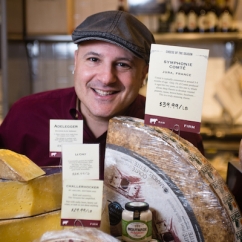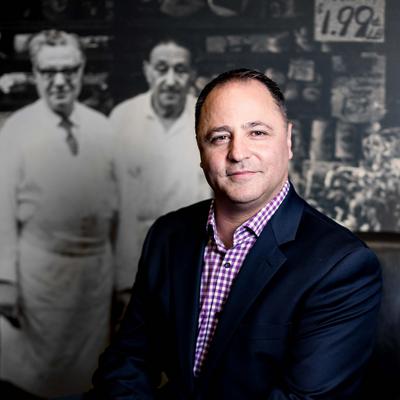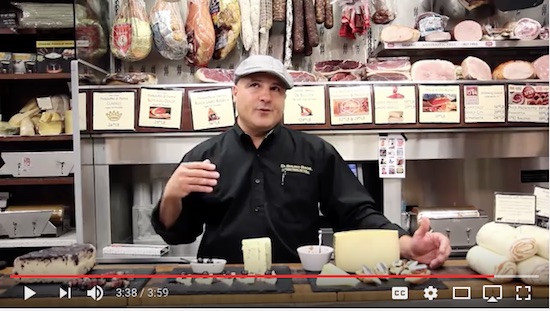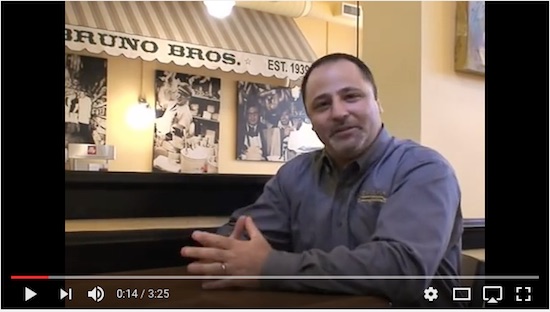Articles and News
The $40 Million Success Story: Important Lessons Jewelers Can Learn From A Luxury Grocer | May 17, 2017 (0 comments)

Philadelphia, PA—Imagine you have a small but highly successful retail store, the best of its kind in your city. Now imagine suddenly deciding to retire, handing the keys over to your grandkids, and walking out the door for good in just 30 days—without making any of the usual preparations that business transition experts advise you to make.
What would happen to your business?
If you’re Di Bruno Bros., your little cheese shop in south Philadelphia’s Italian Market expands to five shops, selling a variety of gourmet groceries. Your heirs also open a catering division, a wholesale division, an e-commerce division and, in the ensuing 25 years, grow from 12 (mainly family) employees into a $40+ million business with 350 employees that is the leading purveyor of fine luxury foods in the Philadelphia region, and even gets tapped to feed Pope Francis on his first U.S. visit.
Brothers Danny and Joe DiBruno came to the United States from Italy in 1930. Like many immigrants, they had heard tales of streets paved with gold. The predominantly-Italian neighborhoods of South Philadelphia were paved with cobblestones, not gold, but it was just right for the little cheese shop the brothers founded in 1939.
Speaking as part of the Family Business Legacy Speaker Series at St. Joseph’s University Haub School of Business in Philadelphia, cousins Bill and Emilio Mignucci, third-generation owners of Di Bruno Bros., detailed the risks and rewards that came with expanding the business and being handed the keys at age 21, without any of the second generation ever taking a leadership role.
So what do a couple of cheesemongers have to do with luxury jewelry?
Everything. In Philadelphia, Di Bruno Bros. is to gourmet food what leading luxury jewelers are to diamonds and gems. Their passion for food and customer service is no different from a jeweler's passion for gemstones and customer service. And everything the Mignucci cousins did to build their business can be applied to any better retail store.
“We didn’t know what we didn’t know,” says Bill Mignucci Jr., president. “It was faith over fear. Naiveté was our best tool.”

Bill Mignucci Jr., president of Di Bruno Bros., the leading purveyor of luxury foods in the Philadelphia, PA region.
The cousins didn’t specifically decide to become luxury grocers; that happened organically through the Di Bruno family’s legendary customer service, extensive inventory of rare cheeses, deep knowledge and passion for their product, and willingness to sit with customers for hours, if need be, to find just the right cheese.
“We're obsessed with cheese. It seems like we're upselling, but we aren't. We're just obsessed with cheese,” says vice president Emilio Mignucci (top of page), who has a culinary background. But their grandfathers, in the month before they left, drilled into the cousins that customers don’t have to shop at Di Bruno, they choose to—and it’s up to them to provide an outstanding experience for every customer.
Click here to watch a video of Emilio Mignucci describing how Di Bruno Bros. created special cheese dishes to feed Pope Francis on his historic visit to Philadelphia in 2015.
The cousins also spend tremendous amount of time with their employees so that customers get the same Di Bruno experience no matter who’s behind the counter.
“Emilio and I will always be operators at our business, not just owners. Emilio is at the stores every Saturday to do store walks and engage with customers and staff. We’re more comfortable on the first [retail] floor than the third-floor office. Employees understand that and they try to keep up with Emilio on knowledge and customer service. We went from 12 employees to 350, yet people still comment on time we spend with our employees,” says Bill Mignucci. “The truth for us is that for our family business to be scalable and sustainable and thrive, it has to go beyond family. Relying solely on family is shortsighted. But we have a very embracing culture and even growing from 12 to 350 employees, we don’t want to dilute the value of people feeling like family.”
Bill sits in on the first day of orientation for every employee, whether it’s the vice president of finance or the janitor. “The first person they meet is me,” he says, and he always tells them “I hope we exceed your expectation as an employee.”
Once on the floor, the cousins listen—a lot, says Emilio. “We create an open dialogue. How can we do it better? We empower [employees] to own their departments and their positions, and we put faith that know and understand what needs to be done, when they’re given clear directives. They put their trust in us to come to work for us, and that’s a piece of what creates our culture.”
When Danny and Joe turned the business over to Bill and Emilio, the cousins were 21 years old and—as Bill self-deprecatingly describes themselves—“a couple of guidos from South Philly! Mike ‘The Situation’ had nothing on me, except for the tax problems!” he laughs, referencing a character in the former MTV reality TV show Jersey Shore. (The actor, Michael Sorrentino, recently was indicted on tax fraud charges offscreen.)
It was an unusual situation for the founders to hand the keys straight to the third generation. Danny and Joe both had health issues and wanted to get out of the business, so they literally stayed only one month to help Emilio and Bill transition in, then they left—and went off on a trip to reinforce the transition.
For the cousins, joining the business was a natural calling, even if they weren’t expecting it at that moment. “If something’s tugging at your heart or mind, you gotta go with it. If we'd had more time to think, we might have talked ourselves out of it,” says Bill.
Many of Bill and Emilio’s aunts and uncles worked in the business and suddenly had to accept that two young nephews whom they’d known since birth were about to become their bosses. Even though the cousins readily admit they didn’t know what they didn’t know when it came to taking risks, they did know what they didn’t know when it came to day-to-day business.
“I learned more from my Aunt Rita than I did at Drexel [University],” where Bill earned his business degree, he says. His aunt could add a column of figures in her head faster than any calculator, he laughed. His father, meanwhile, though not in the business himself, was an executive at General Electric and coached the cousins to understand the questions they didn’t yet know to ask, such as ROI and time and energy spent.
The two cousins’ strengths—Emilio’s culinary background and Bill’s business background—are complimentary, and the two also are like-minded when it comes to risk-taking.
For example, the two were advised by consultants against opening a flagship store in Philadelphia’s tony Rittenhouse Square. Consultants were never popular with Danny and Joe Di Bruno (“You’re gonna come tell us how to run our business?”) and the founders also thought customers would hate it if their favorite store expanded throughout the city.
But the cousins forged ahead. Enough focus groups and research convinced the two that Center City Philadelphia—mired in recession in the early 1990s—was ripe for improvement, as a new convention center was slated to be built next to the old Reading Terminal market.
“To expand from one store to two was a HUGE step,” says Bill. Customers didn’t like it at first, and Joe and Danny didn’t like it either. But, says Emilio, they got lucky—and indeed a renaissance of Center City Philadelphia did explode soon after.
“The timing was right and that propelled us forward without diluting the brand, But we're not perfect. We've had issues with bright shiny objects that take you off track. It’s happened over and over, and you try to be disciplined enough to follow your north star,” says Emilio.
“Decisions we make [today] can't be as random or willy-nilly as they used to be. We meet quarterly to identify goals for our key team and we meet weekly to hold everyone accountable,” says Bill.
Click here to watch a video of Bill Mignucci discussing the parallel rise of Di Bruno Bros. and its beloved home city of Philadelphia.
There have been a few “teachable moments” along the way, say the cousins. “Customer service feedback comes right to Emilio and I and we read it all. We've always done and always do. It’s a security blanket and keeps us close on business.”
There’s great opportunity in customer recovery, he says. The company serves 30,000 customers a week between its retail and wholesale division and e-commerce and catering. Mistakes are going to happen but as Bill says, it’s not the mistake, it's how you recover and respond. Even if it’s Sunday afternoon, customers will get a response within 24 hours.
A lot of businesses like to read what they’re doing great and neglect negative feedback, adds Emilio. But you need to hear it and see the ugly truth. “It’s opportunity! There’s no greater opportunity than putting yourself out there and responding. If someone took the time to write, they deserve to know you read it. You can’t get better if you don't acknowledge what's going on. Good conflict helps you grow.”
“I’m proud that Di Bruno is a revered brand,” adds Bill. “There’s no room for stubbornness or egos in the food business, or really any business. Never stop listening to customers.”
Staying true to the brand’s core values is what will carry you, say the cousins. “You need something to anchor that's in the heart, and to trust in the other members in the business. Big business decisions are something that are never certain, and for that you need family you trust and staff you trust.
“Having a 75-year-old brand doesn't hurt but you still need trust. If that's not good enough, we will not go further. Shopkeepers as storytellers: you can't franchise that. When we're uncertain about things, we go back to our roots and look at Danny and Joe’s picture.”









